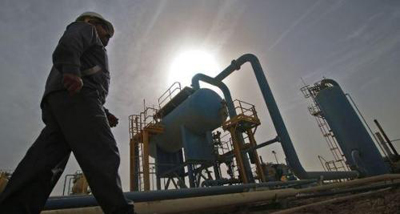Bahrain Discovers Largest Oil Field With 80 Billion Barrels In Reserves
Paul Craig Roberts
 Bahrain officials have revealed that the tiny gulf kingdom has discovered some 80 billion barrels of shale (otherwise known as tight) oil - the kingdom's largest oil and gas find ever. The field also discovered 14 trillion cubic feet of natural gas beneath an existing field. Bahrain officials have revealed that the tiny gulf kingdom has discovered some 80 billion barrels of shale (otherwise known as tight) oil - the kingdom's largest oil and gas find ever. The field also discovered 14 trillion cubic feet of natural gas beneath an existing field.
Oil Minister Sheikh Mohammed bin Khalifa Al Khalifa said the kingdom has not yet determined how much of the oil can be easily extracted, according to the Associated Press.
The oil fields were discovered in the offshore Khalij al-Bahrain Basin, which covers some 770 square miles in the shallow waters off Bahrain's west coast.
The underwater shale would dwarf the country's existing reserves.
According to figures from the US Energy Administration, Bahrain currently pumps about 45,000 barrels a day from its Bahrain Field. It also shares income from a deposit with Saudi Arabia that produces about 300,000 barrels a day.
"Initial analysis demonstrates the find is at substantial levels, capable of supporting the long-term extraction of tight oil and deep gas," the Sheikh said.
He added during the news conference, which was held in Manama on Wednesday, that Bahrain's National Oil and Gas Authority hoped to lure foreign oil and gas firms to develop the field where the reserves were found, per the BBC.

Bahrain has been pumping oil since 1932 and was among the first Arab Gulf states to extract oil.
According to the Guardian, industry consultants DeGolyer and MacNaughton (Demac) have worked with Bahrain to evaluate the newfound reserves.
"Demac evaluated the reservoir and test data, evaluated volumetric and recovery potential, and provided reports documenting both prospective and contingent resources. This is a project which breaks new ground for the industry," a spokesperson said.
The country has not historically been a major oil producer - but the new field, which officials said could come online within five years, has the potential to dramatically change that. According to the initial estimates, the oil deposits are roughly the size of Russia's oil deposits.
It could also help bolster the sagging Bahrainian economy, which has suffered from low oil prices and unrest among the majority Shia population. The country, like most of its neighbors, is run by a Sunni monarchy, and low oil prices have forced it to cut back on popular government handouts, leading to a some unrest.
 our mission: our mission:
to widen the scope of financial, economic and political information available to the professional investing public.
to skeptically examine and, where necessary, attack the flaccid institution that financial journalism has become.
to liberate oppressed knowledge.
to provide analysis uninhibited by political constraint.
to facilitate information's unending quest for freedom.
our method: pseudonymous speech...
Anonymity is a shield from the tyranny of the majority. it thus exemplifies the purpose behind the bill of rights, and of the first amendment in particular: to protect unpopular individuals from retaliation-- and their ideas from suppression-- at the hand of an intolerant society.
...responsibly used.
The right to remain anonymous may be abused when it shields fraudulent conduct. but political speech by its nature will sometimes have unpalatable consequences, and, in general, our society accords greater weight to the value of free speech than to the dangers of its misuse.
Though often maligned (typically by those frustrated by an inability to engage in ad hominem attacks) anonymous speech has a long and storied history in the united states. used by the likes of mark twain (aka samuel langhorne clemens) to criticize common ignorance, and perhaps most famously by alexander hamilton, james madison and john jay (aka publius) to write the federalist papers, we think ourselves in good company in using one or another nom de plume. particularly in light of an emerging trend against vocalizing public dissent in the united states, we believe in the critical importance of anonymity and its role in dissident speech. like the economist magazine, we also believe that keeping authorship anonymous moves the focus of discussion to the content of speech and away from the speaker- as it should be. we believe not only that you should be comfortable with anonymous speech in such an environment, but that you should be suspicious of any speech that isn't.
www.zerohedge.com
| 



